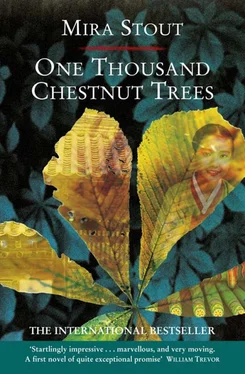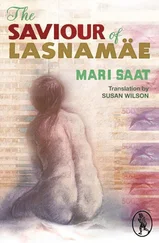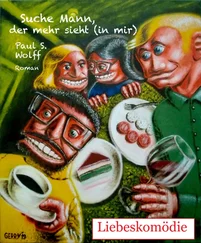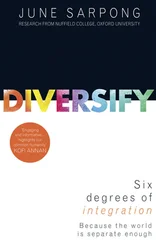For Grandfather, who had been raised to pity the barbarian ways of the Japanese rather than to condemn them, being forced to bow to them in his waning years became an intolerable degradation. He grew ill, ageing quickly.
Near the end of his life, Min Gong-ju, now a commoner, returned with a Buddhist monk, to the land he once owned in the stupendous Sorak Mountains, confiscated by the Japanese. Grandfather became obsessed with erecting a family temple on the highest peak, in defiance of the loss of centuries of stewardship.
He ordered the temple to be built in the grounds of a hermitage to symbolize the lonely and vain path of enlightenment, and to represent inviolate Korean sovereignty. The Min name was to be carved upon the temple pillars. Min Gong-ju ordered one thousand chestnut trees to be planted around the temple for longevity, their eventual lushness and strength were to screen it from enemy detection. The temple was constructed in secret by several of his former serfs, who risked their lives to do so. Soon after its completion, my grandfather died. He never saw the temple.
Since Lord Min’s death, the muscular gables of our ancestral house had lost their air of potency and assurance. The calm and old-fashioned grace within its rooms had also vanished with my grandmother’s spirit. She had died six months after her husband. But the heaviness in the household had set in a few years before, with the unhappy behaviour of Yong-lae, the eldest Min son, now in his thirties.
Yong-lae, it was said, had inherited his father’s good looks, intelligence, and fondness for riding a white horse, but entirely lacked his backbone. Where Lord Min had revelled in the responsibility and dignity of his station, dutifully officiating at dull civic and royal ceremonies wherever he was needed, and lending his attention to humble and humdrum estate maintenance, Yong-lae wrote the occasional poem and spent the greater part of his time visiting his tailor in Seoul.
One year, Yong-lae secretly ordered seventy splendid coats to be made for himself. This was a great mystery to us, because we never particularly noticed his new clothes. When the bill arrived my grandfather was enraged. He confined Yong-lae to the estate grounds for two months, and ordered a servant to burn all of his son’s trousers but one scruffy pair, which he was ordered to wear with his new coats.
But this ploy backfired. Yong-lae’s sartorial appetite remained undiminished. Once the dramatic value of grandfather’s action had faded, Yong-lae genuinely needed new trousers. But a weakness for fine clothing was the lesser of his peccadilloes.
‘Going to his tailor in Seoul’ soon became a euphemism for drinking binges, which began tamely enough, but worsened. Predictably, not even Yong-lae’s marriage to a lovely and sympathetic young woman of a neighbouring clan could keep him away from the bars and taverns of Seoul.
Yong-lae’s drunkenness shamed the family. It was an awful cliché, my grandfather complained to him, for an eldest son to be so irresponsible. But Yong-lae did not smile and promise to reform, as he might have done before. It was now as if his father were discussing someone else, whom he only vaguely remembered.
Grandfather, already shattered by the invasion, could not fully fathom that his right-hand son, traditionally relied upon for support and leadership in parents’ old age, was a sick human being, as useless as a broken leg. Towards the end of Grandfather’s life, the look of disbelief frozen in his eyes was terrible to see. The burden of assuaging Yong-lae’s failure fell to my father, Bong-lae, the second son.
Father was silent now as he pushed his bicycle. Although the big house would always be splendid, a symbol of better times, the farther we withdrew from the grand main house, the happier I felt. The hill rose up a gentle slope to our farm, and soon we were home.
How can I describe it? It was nothing special. And yet to me, it was a paradise. Just a traditional Korean farmhouse of wood and white clay, with a winged, grey tiled roof, set comfortably in a crab apple orchard, watched over by jagged blue mountains. Unlike the big house, we did not have a colony of live-in servants, just a housekeeper, and a tenant farmer and his small family in a nearby cottage to perform heavy chores, tend the livestock and vegetable garden, and help with the prodigious work of preparing food for winter.
Above all, home was green. The green of new rice grasses. The green of ripening fruit. The green of a bride’s gown. Out of my bedroom window, wide verdant fields, thick copses, bamboo groves and gracious trees stretched outwards, uninterrupted on all sides. The teasing mists of the East Sea added enigma to the solidity of the land.
My mother, wearing a pale-blue linen han-bok with white ribbons, descended the step to greet us. My little sister, who was two, followed her out of doors and fastened herself onto my father’s leg. He picked her up and gave her a piece of toffee.
I took off my shoes, entered the house, and thirsty from the journey, went straight into the kitchen to get a drink of water from the well. The enormous kitchen was very much the centre of the house, quite literally the hearth of our home.
It was a two-storey annexe where grain and dry goods were stored above, with an outdoor wing for the chickens and pigs, and below, the furnace and ovens generated our ondol heating – the Korean system of flue pipes which carry heat beneath the oiled, sepia-papered floors of every room so they are warm to sit and sleep upon. Here, behind a large embroidered silk screen, we also bathed, drawing our water from the indoor well which was kept covered with a huge carved wooden lid.
It is the smell of that dark timbered kitchen that I remember still; a sweet and earthy scent of hay and fermenting soya beans. More than any other, this was the smell of my childhood. It also held the transient odours of delicious soups simmering in great iron cauldrons and succulent bulgoki grilling, but the scent of spicy hay was the irreplaceable constant, lingering in the eaves, and deep in my memory.
My mother supervised the making of our own soya sauce, duenjang and kochujang sauces in the grindstones, the slicing of radish and cucumber for pickles and, of course, the hand-manufacture of several varieties of hot kimchi, which were kept in enormous stone urns on the jang terrace in the garden. It was a year-round activity to keep the food stores filled.
My brother, sister and I played boisterous games of hide-and-seek in the storage loft beneath the mighty oak beams, trying not to upset colourful baskets, jars, and sacks of provisions. Jin-ho – showing off that he could read and I couldn’t – called it Ali Baba’s treasure cave, for it held everything we could imagine.
There were baskets of garlic and ginger, brass bowls of whole green chillies, dried red chilli flakes, cold iron cauldrons of soya beans for sprouts and curd, huge sacks of rice, barley, maize, flour, potatoes, sweet potatoes, ceramic jars of dried chestnuts, ginseng root, green and preserved persimmons and crystallized ginger, dried plums, dried mushrooms, anchovies, and stacks of kite-shaped dried cuttlefish – a local specialty. Serried rows of stone flagons stood by the staircase; honey, sesame and fish oil, home-made rice wine and soju, a fiery and disgusting grown-up drink which Jin-ho had been recently sick on.
I drank the cold spring water, and went out to climb the crab apple tree. I amused myself for some time by sitting on the highest bough, pelting my little sister with apple blossoms. At first she loved it, tipping up her face to welcome the petals, but then decided it was all too much, and began to scream.
My mother opened the kitchen door and struck the brass gong. Forgetting our petal fight, Myung-hi and I raced inside for a simple lunch. Afterwards we had our usual nap. I fell asleep dreaming blissfully of rice cakes and bicycles.
Читать дальше












